Welcome!
I am a mathematician and physicist, currently based at the LMU Munich Center for Mathematical Philosophy, the LMU Graduate School of Systemic Neurosciences and the Institute for Psychology of the University of Bamberg.
My research focuses on Mathematical Physics on the one hand, and on Mathematical Consciousness Science on the other hand:
- Within Mathematical Physics, I work on the foundations of physics. This includes the foundations of quantum theory, but also foundational questions in general relativity and quantum field theory. My research is mainly devoted to a new proposal for a unified physical theory, which for historical reasons is named the Theory of Causal Fermion Systems. I am mainly involved in exploring how the formalism of this theory relates to the mathematical form of quantum theory, general relativity and quantum field theory. Eventually, the hope is to use these results to improve the understanding of the theory's limiting cases, with correction terms to the fundamental laws of physics being on the horizon.
- When it comes to consciousness, my goal is to develop a solid mathematical foundation for the empirical and theoretical research that is carried out to date. This includes defining and improving the formal structure of theories of consciousness that have been proposed based on empirical evidence, developing detailed models of the experiments that are performed, and exploring the formal implications of the foundations of the field as provided by philosophy of mind. Because this is very reminiscent of the role which Mathematical Physics plays within Physics, research along these lines is now called Mathematical Consciousness Science.
Below you find an overview of my publications (ordered by papers on consciousness, papers on mathematical physics, books and special issues), talks and a few recordings, as well as a vita. If you want to have a look my teaching (covering mathematics, physics and philosophy), please head over to the teaching page. A list of conferences, workshops and seminar series I've organized is available here. Finally, there is the worth while section in which I have collected a few perks. More is on my Twitter page. If there is anything else you'd like to know, don't hesitate to shoot me an email.
Papers on Consciousness:
The Newman Problem of Consciousness Science
Johannes Kleiner
PreprintThe Newman problem is a fundamental problem that threatens to undermine structural assumptions and structural theories throughout philosophy and science. Here, we consider the problem in the context of consciousness science. We introduce and discuss the problem, and explain why it is detrimental not only to structuralist assumptions, but also to theories of consciousness, if left unconsidered. However, we show that if phenomenal spaces, and mathematical structures of conscious experience more generally, are understood in the right way, the Newman problem does not arise. The upshot of our paper is that consciousness science needs to be careful in which definition of structure to consider, but if it is, the Newman problem disappears. ☛ PhilArchive version
Consciousness qua Mortal Computation
Johannes Kleiner
PreprintComputational functionalism posits that consciousness is a computation. Here we show, perhaps surprisingly, that it cannot be a Turing computation. Rather, computational functionalism implies that consciousness is a novel type of computation that has recently been proposed by Geoffrey Hinton, called mortal computation. ☛ Arxiv version ☛ PhilArchive version
Towards a Structural Turn in Consciousness Science
Johannes Kleiner
Consciousness and Cognition, 2024Recent activities in virtually all fields engaged in consciousness studies indicate early signs of a structural turn, where verbal descriptions or simple formalisations of conscious experiences are replaced by structural tools, most notably mathematical spaces. My goal here is to offer three comments that, in my opinion, are essential to avoid misunderstandings in these developments early on. These comments concern metaphysical premises of structural approaches, the viability of structure-preserving mappings, and the question of what a structure of conscious experience is in the first place. I will also explain what, in my opinion, are the great promises of structural methodologies and how they might impact consciousness science at large. ☛ Published version (open access)
Active Inference in String Diagrams: A Categorical Account of Predictive Processing and Free Energy
Sean Tull & Johannes Kleiner & Toby St Clere Smithe
PreprintWe present a categorical formulation of the cognitive frameworks of Predictive Processing and Active Inference, expressed in terms of string diagrams interpreted in a monoidal category with copying and discarding. This includes diagrammatic accounts of generative models, Bayesian updating, perception, planning, active inference, and free energy. In particular we present a diagrammatic derivation of the formula for active inference via free energy minimisation, and establish a compositionality property for free energy, allowing free energy to be applied at all levels of an agent's generative model. Aside from aiming to provide a helpful graphical language for those familiar with active inference, we conversely hope that this article may provide a concise formulation and introduction to the framework. ☛ Arxiv version
If consciousness is dynamically relevant, artificial intelligence isn't conscious
Johannes Kleiner & Tim Ludwig
PreprintWe demonstrate that if consciousness is relevant for the temporal evolution of a system's states -- that is, if it is dynamically relevant -- then AI systems cannot be conscious. That is because AI systems run on CPUs, GPUs, TPUs or other processors which have been designed and verified to adhere to computational dynamics that systematically preclude or suppress deviations. The design and verification preclude or suppress, in particular, potential consciousness-related dynamical effects, so that if consciousness is dynamically relevant, AI systems cannot be conscious. ☛ Arxiv version
What is a Mathematical Structure of Conscious Experience?
Johannes Kleiner & Tim Ludwig
Synthese, 2024Several promising approaches have been developed to represent conscious experience in terms of mathematical spaces and structures. What is missing, however, is an explicit definition of what a ‘mathematical structure of conscious experience’ is. Here, we propose such a definition. This definition provides a link between the abstract formal entities of mathematics and the concreta of conscious experience; it complements recent approaches that study quality spaces, qualia spaces, or phenomenal spaces; and it provides a general method to identify and investigate structures of conscious experience. We hope that ultimately this work provides a basis for developing a common formal language to study consciousness. ☛ Published version (open access)
The Closure of the Physical, Consciousness and Scientific Practice
Johannes Kleiner & Stephan Hartmann
PreprintWe analyse the implications of the closure of the physical for experiments in the scientific study of consciousness when all the details are considered, especially how measurement results relate to physical events. It turns out that the closure of the physical has surprising implications that conflict with scientific practice. These implications point to a fundamental flaw in the paradigm underlying many experiments conducted to date and pose a challenge to any research programme that aims to ground a physical functionalist or identity-based understanding of consciousness on empirical observations. ☛ Arxiv version
Falsification and Consciousness
Johannes Kleiner & Erik Hoel
Neuroscience of Consciousness, 2021The search for a scientific theory of consciousness should result in theories that are falsifiable. However, here we show that falsification is especially problematic for theories of consciousness. We formally describe the standard experimental setup for testing these theories. Based on a theory’s application to some physical system, such as the brain, testing requires comparing a theory’s predicted experience (given some internal observables of the system like brain imaging data) with an inferred experience (using report or behavior). If there is a mismatch between inference and prediction, a theory is falsified. We show that if inference and prediction are independent, it follows that any minimally informative theory of consciousness is automatically falsified. This is deeply problematic since the field’s reliance on report or behavior to infer conscious experiences implies such independence, so this fragility affects many contemporary theories of consciousness. Furthermore, we show that if inference and prediction are strictly dependent, it follows that a theory is unfalsifiable. This affects theories which claim consciousness to be determined by report or behavior. Finally, we explore possible ways out of this dilemma. ☛ Published version ☛ Arxiv version
The Mathematical Structure of Integrated Information Theory
Johannes Kleiner & Sean Tull
Frontiers in Applied Mathematics and Statistics, 2021Integrated Information Theory is one of the leading models of consciousness. It aims to describe both the quality and quantity of the conscious experience of a physical system, such as the brain, in a particular state. In this contribution, we propound the mathematical structure of the theory, separating the essentials from auxiliary formal tools. We provide a definition of a generalized IIT which has IIT 3.0 of Tononi et al., as well as the Quantum IIT introduced by Zanardi et al. as special cases. This provides an axiomatic definition of the theory which may serve as the starting point for future formal investigations and as an introduction suitable for researchers with a formal background. ☛ Published version ☛ Arxiv version
Integrated Information in Process Theories
Sean Tull & Johannes Kleiner
Journal of Cognitive Science, 2021We demonstrate how integrated information and other key notions from Tononi et al.’s Integrated Information Theory (IIT) can be
studied within the simple graphical language of process theories (symmetric monoidal categories). This allows IIT to be
generalised to a broad range of physical theories, including as a special case the Quantum IIT of Zanardi, Tomka and Venuti,
and sets the foundation for a categorical definition of IIT. ☛ Published version ☛ Arxiv version
Brain states matter. A reply to the unfolding argument.
Johannes Kleiner
Consciousness and Cognition, 2020Recently, it has been claimed that Integrated Information Theory and other theories of its type cannot explain consciousness (“unfolding argument”). We unravel this argument mathematically and prove that the premises of the argument imply a much stronger result according to which the observed problem holds for almost all theories of consciousness. We find, however, that one of the premises is unwarranted and show that if this premise is dropped, the argument ceases to work. Thus our results show that the claim of the unfolding argument cannot be considered valid. The premise in question is that measures of brain activity cannot be used in an empirical test of theories of consciousness. ☛ Published version ☛ Psyarxiv version
Mathematical Models of Consciousness
Johannes Kleiner
Entropy, 2020In recent years, promising mathematical models have been proposed that aim to describe conscious experience and its relation to the physical domain. Whereas the axioms and metaphysical ideas of these theories have been carefully motivated, their mathematical formalism has not. In this article, we aim to remedy this situation. We give an account of what warrants mathematical representation of phenomenal experience, derive a general mathematical framework that takes into account consciousness’ epistemic context, and study which mathematical structures some of the key characteristics of conscious experience imply, showing precisely where mathematical approaches allow to go beyond what the standard methodology can do. The result is a general mathematical framework for models of consciousness that can be employed in the theory-building process. ☛ Published version ☛ Arxiv version
Papers on Mathematical Physics:
A Class of Conserved Surface Layer Integrals for Causal Variational Principles
Felix Finster & Johannes Kleiner
Calculus of Variations and Partial Differential Equations, 2019In the theory of causal fermion systems, the physical equations are obtained as the Euler–Lagrange equations of a causal variational principle. Studying families of critical measures of causal variational principles, a class of conserved surface layer integrals is found and analyzed. ☛ Published version ☛ Arxiv version
Dynamics of Causal Fermion Systems - Field Equations and Correction Terms for a New Unified Physical Theory
Johannes Kleiner
Doctoral Thesis Mathematics, 2017The theory of causal fermion systems is a new physical theory which aims to describe a fundamental level of physical reality. Its mathematical core is the causal action principle. In this thesis, we develop a formalism which connects the causal action principle to a suitable notion of fields on space-time. We derive field equations from the causal action principle and find that the dynamics induced by the field equations conserve a symplectic form which gives rise to an Hamiltonian time evolution if the causal fermion system admits a notion of time. In this way, we establish the dynamics of causal fermion systems. Remarkably, the causal action principle implies that there are correction terms to the field equations, which we subsequently derive and study. In particular, we prove that there is a stochastic and a non-linear correction term and investigate how they relate to the Hamiltonian time evolution. Furthermore, we give theorems which generalize the connection between symmetries and conservation laws in Noether's theorems to the theory of causal fermion systems. The appearance of the particular correction terms is reminiscent of dynamical collapse models in quantum theory. ☛ Published version ☛ Arxiv version
I gratefully acknowledge the support of the Studienstiftung des Deutschen Volkes!
A Hamiltonian Formulation of Causal Variational Principles
Felix Finster & Johannes Kleiner
Calculus of Variations and Partial Differential Equations, 2017Causal variational principles, which are the analytic core of the physical theory of causal fermion systems, are found to have an underlying Hamiltonian structure, giving a formulation of the dynamics in terms of physical fields in space-time. After generalizing causal variational principles to a class of lower semi-continuous Lagrangians on a smooth, possibly non-compact manifold, the corresponding Euler–Lagrange equations are derived. In the first part, it is shown under additional smoothness assumptions that the space of solutions of the Euler–Lagrange equations has the structure of a symplectic Fréchet manifold. The symplectic form is constructed as a surface layer integral which is shown to be invariant under the time evolution. In the second part, the results and methods are extended to the non-smooth setting. The physical fields correspond to variations of the universal measure described infinitesimally by one-jets. Evaluating the Euler–Lagrange equations weakly, we derive linearized field equations for these jets. In the final part, our constructions and results are illustrated in a detailed example on R^1,1×S1 where a local minimizer is given by a measure supported on a two-dimensional lattice. ☛ Published version ☛ Arxiv version
Noether-Like Theorems for Causal Variational Principles
Felix Finster & Johannes Kleiner
Calculus of Variations and Partial Differential Equations, 2016The connection between symmetries and conservation laws as made by Noether’s theorem is extended to the context of causal variational principles and causal fermion systems. Different notions of continuous symmetries are introduced. It is proven that these symmetries give rise to corresponding conserved quantities, expressed in terms of so-called surface layer integrals. In a suitable limiting case, the Noether-like theorems for causal fermion systems reproduce charge conservation and the conservation of energy and momentum in Minkowski space. Thus the conservation of charge and energy-momentum are found to be special cases of general conservation laws which are intrinsic to causal fermion systems. ☛ Published version ☛ Arxiv version
Causal Fermion Systems as a Candidate for a Unified Physical Theory
Felix Finster & Johannes Kleiner
Journal of Physics: Conference Series, 2015The theory of causal fermion systems is an approach to describe fundamental physics. Giving quantum mechanics, general relativity and quantum field theory as limiting cases, it is a candidate for a unified physical theory. We here give a non-technical introduction. ☛ Published version ☛ Arxiv version
Books:
Progress and Visions in Quantum Theory in View of Gravity
Eds. Felix Finster, Domenico Giulini, Johannes Kleiner, Jürgen Tolksdorf
Birkhäuser, 2020This book focuses on a critical discussion of the status and prospects of current approaches in quantum mechanics and quantum field theory, in particular concerning gravity. ☛ Published version
Quantum Mathematical Physics
Eds. Felix Finster, Johannes Kleiner, Christian Röken, Jürgen Tolksdorf
Birkhäuser, 2015Quantum physics has been highly successful for more than 90 years. Nevertheless, a rigorous construction of interacting quantum field theory is still missing. Moreover, it is still unclear how to combine quantum physics and general relativity in a unified physical theory. Attacking these challenging problems of contemporary physics requires highly advanced mathematical methods as well as radically new physical concepts. This book presents different physical ideas and mathematical approaches in this direction. ☛ Published version
Special Issues:
Mathematical and Empirical Foundations of Models of Consciousness
Eds. Xerxes Arsiwalla, Johannes Kleiner, Kobi Kremnizer, Pedro Resende, Sean Tull
Frontiers inApplied Mathematics and Statistics & Frontiers inPsychology - Consciousness Research & Frontiers in Computational Neuroscience, 2021
Models of Consciousness
Eds. Ian Durham, Johannes Kleiner, Yakov Kremnitzer, Jonathan Mason, Robert Prentner
Entropy, 2020
Events:
I love to organize scientific events. Below is a small selection of events I've co-organized. Others are listed here.
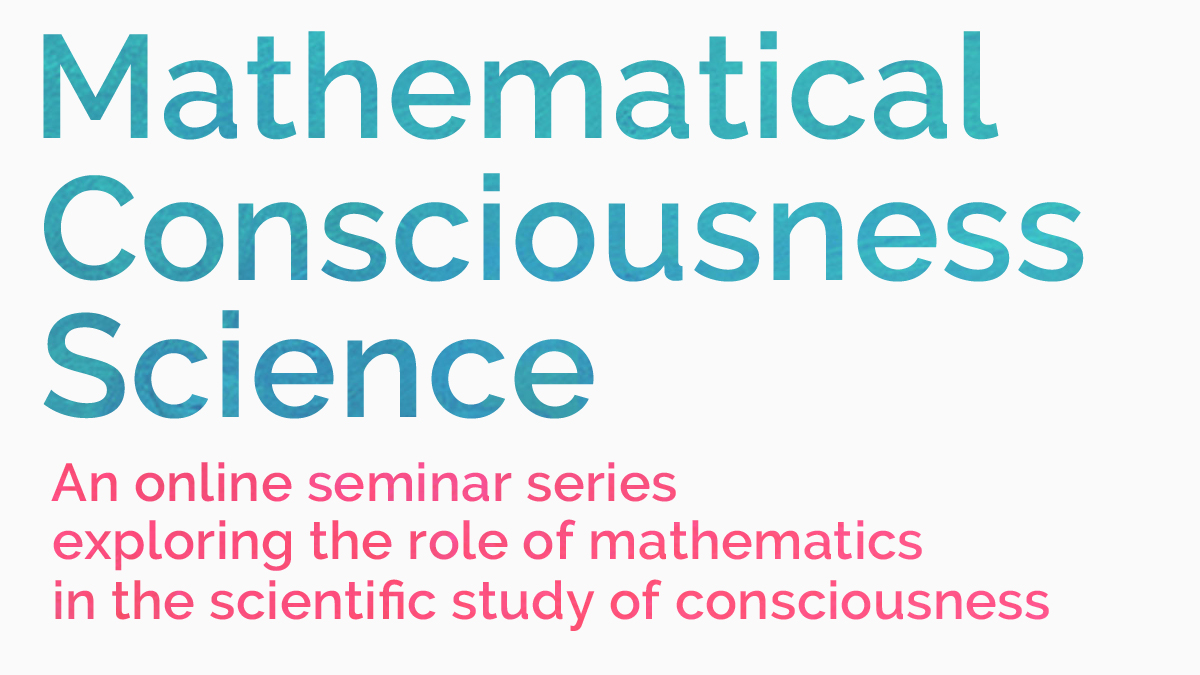 |
|
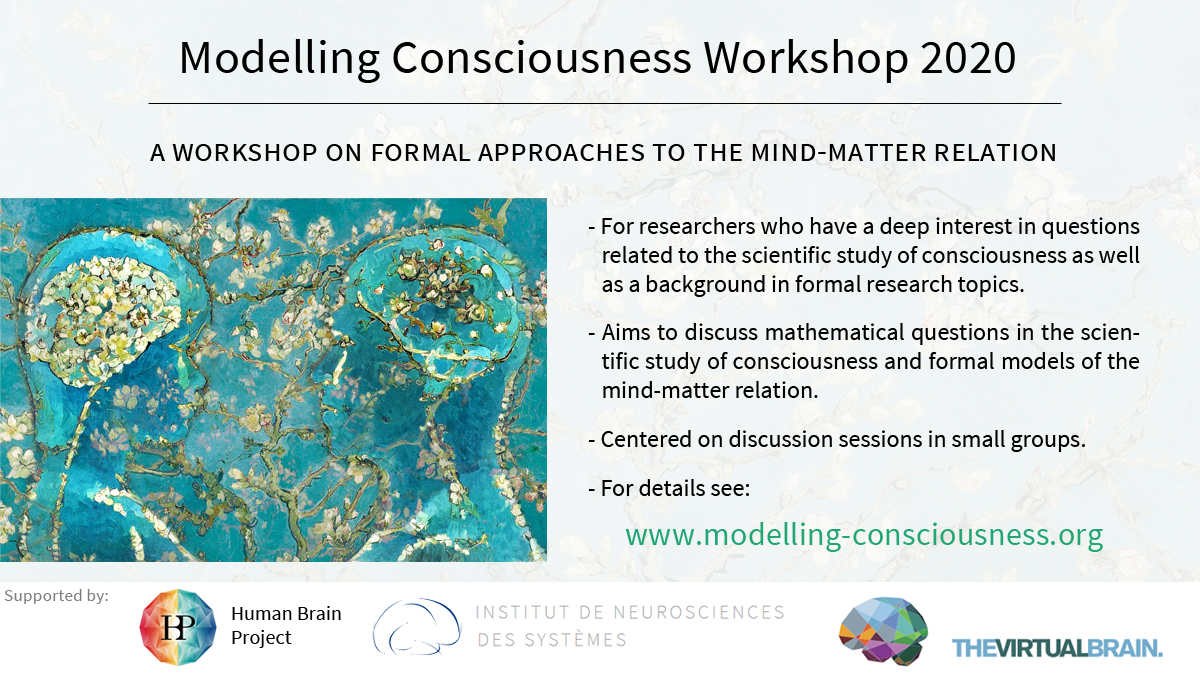 |
|---|
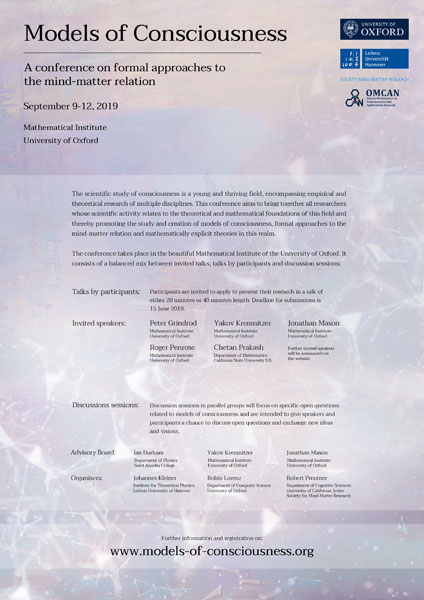 |
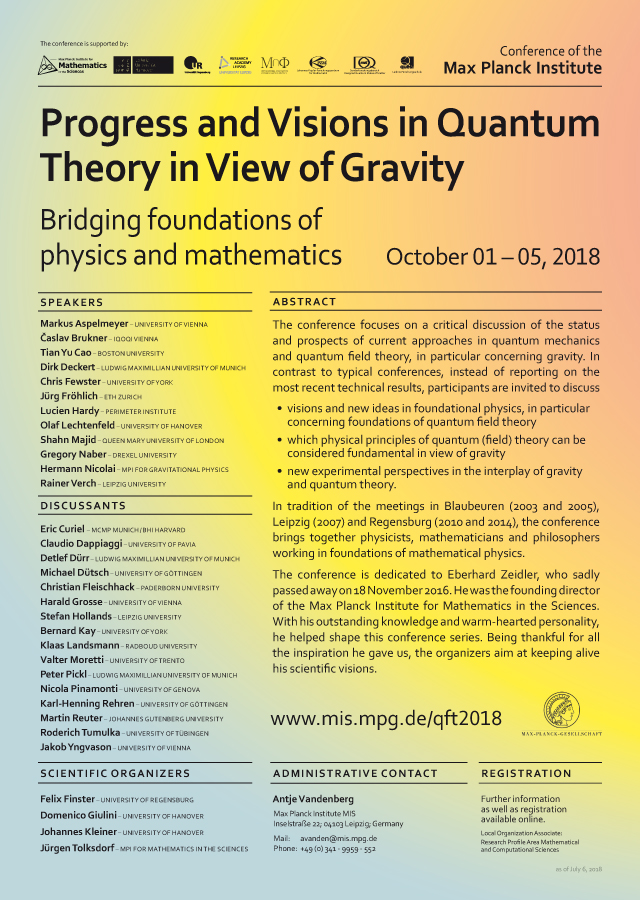 |
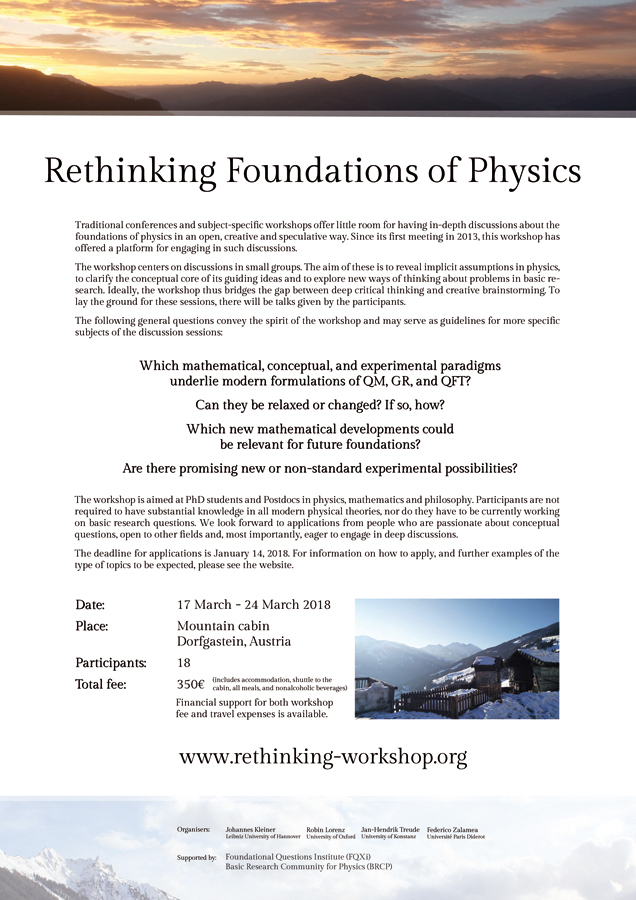 |
|---|
Community-building:
I happened to meet truly amazing people at some of the events I've co-organized, both in physics and consciousness science. With some of them, I founded the following associations:
Basic Research Community for Physics
Founded in 2015. ☛ Website ☛ Constitution
Association for Mathematical Consciousness Science
Founded in 2021. ☛ Website ☛ Constitution
If you share the ideals behind either of them, you're cordially invited to apply for membership. Cf. the websites for respective information.
Vita:
Here is my scientific CV, in case you're interested.
If you're interested in which kind of teaching I have done, you can find more about this here.
Miscellanea:
Here is a video of my 20-minute talk on the Models of Consciousness Conference at Oxford. It covers the fist few pages of my "Mathematical
Models of Consciousness" paper arXiv:1907.03223. Since time was short, I had to rush a bit in the beginning. Sorry for that ;-)
The recording of my talk for Consciousness Club Tokyo, featuring "Falsification and Consciousness"
and a different route to my "Mathematical "Models of Consciousness":
An introductory talk "What is Mathematical Consciousness Science?"
for Bristol University's Physics Society:
The following is a very brief explanation of what Mathematical Consciousness Science is.
It's for a general audience, apologies for not including fancy technical details. ;-)
And here is my input to a debate about the "unfolding argument":
This is a video which explains the Theory of Causal Fermion Systems to a general audience.
Unfortunately, it's only available in German.
Talks:
Here is a list of talks I've given, ordered chronologically. Apologies in case the list is somewhat out of date, I seem to only think about updating this once a year or so. Shoot me an email in case you need an up to date list!
44.) The Mathematical Structure of Integrated Information Theory (Modelling Consciousness Workshop, Online, March 2020)
43.) On Mathematical Approaches in the Scientific Study of Consciousness (Department of Mathematics, Instituto Superior Técnico Lisboa, Lisbon, November 2019)
42.) Models of Consciousness – Perspectives on an emerging field of applied mathematics (Department of Mathematics, University of Regensburg, October 2019)
41.) Stochastic and Non-Linear Correction Terms for the Linearized Field Equations of Causal Fermion Systems (Working Seminar on Mathematical Physics, University of Regensburg, October 2019)
40.) On the Mathematical Basis of Models of Consciousness (Mathematical Institute, University of Oxford, September 2019)
39.) Key Ideas of the Theory of Causal Fermion Systems (L'Agape Summer School on Theoretical Physics, Mézeyrac, France, July 2019)
38.) Models of Consciousness (Mathematical Institute, University of Göttingen, April 2019)
37.) Groundings of the Scientific Study of Consciousness (Modelling Consciousness Workshop, Dorfgastein, March 2019)
36.) Qualia and Symmetries (Munich Center for Mathematical Philosophy, LPS Colloquium, October 2018)
35.) Qualia and Symmetries (Seminar Progress and Visions in the Scientific Study of the Mind-Matter Relation, November 2018)
34.) Integrated Information Theory 3.0 (L'Agape Summer School on Theoretical Physics, Mézeyrac, France, July 2018)
33.) On Modelling Dual Aspect Monism (Workshop Models for Dual-Aspect Monism, Johanneshof, Germany, June 2018)
32.) Lecturer at the International Spring School on Causal Fermion Systems (Regensburg University, February 2018)
31.) Quantum Einstein Equivalence: So close, no matter how far? (Revising Foundations of Physics Workshop, UCL, December 2017)
30.) Dynamics of Causal Fermion Systems (PhD Defence, Colloquium of Department for Mathematics, Regensburg University, September 2017)
29.) Correction Terms for Field Equations from Causal Fermion Systems (Working Seminar Mathematical Physics, Regensburg University, July 2017)
28.) La cuisine différente. Impressions from a new approach to fundamental physics (Quantum Lunch Seminar, University of Oxford, June 2017)
27.) Causal Variational Principles (PDE CDT Student Seminar, University of Oxford, June 2017)
26.) Causal Fermion Systems as a Candidate for a Unified Physical Theory (Lobster Lunch Seminar, University of Oxford, May 2017)
25.) Reductionism, ad absurdum? (Rethinking Foundations of Physics Workshop 2017, Dorfgastein, Austria, March 2017)
24.) Naked Singularities and the Penrose Inequality II (Working Seminar Mathematical Physics, Regensburg University, January 2017)
23.) Naked Singularities and the Penrose Inequality I (Working Seminar Mathematical Physics, Regensburg University, December 2016)
22.) Hamiltonian Time Evolution for Causal Variational Priciples (McGill University, Montreal, Canada, November 2016)
21.) Hamiltonian Time Evolution for Causal Variational Priciples (Harvard CMSA Members' Seminar, USA, September 2016)
20.) A New Candidate for a Unified Physical Theory (Harvard CMSA Mathematical Physics Seminar, USA, September 2016)
19.) Towards a Connection between Loop Quantum Gravity and Causal Fermion Systems (Working Seminar Mathematical Physics, University of Regensburg, Germany 2016)
18.) Spring School on Causal Fermion Systems (Regensburg, Germany, March 2016, Link)
17.) The jet bundle dynamics of causal fermion systems (Seminar Partial Differential Equations on Globally Hyperbolic Spacetimes and Working Seminar Mathematical Physics, Regensburg, October 2015)
16.) Physik und Transzendenz (Doktorandentagung Studienstiftung des deutschen Volkes, Bonn, November 2015)
15.) Noether-Like Theorems for Causal Variational Principles (Seminar Partial Differential Equations on Globally Hyperbolic Spacetimes and Working Seminar Mathematical Physics, Regensburg, October 2015)
14.) Causal Fermion Systems as a Candidate for a Unified Physical Theory (Conference "Quantum Theory: from foundations to technologies", Växjö, Sweden)
13.) Noether-like theorems for causal variational principles (Working Seminar Mathematical Physics, Regensburg, June 2015)
12.) Imre Lakatos' Conception of Science (Doktorandentagung Studienstiftung des deutschen Volkes, Heidelberg, April 2015)
11.) Physik und Transzendenz (A series of three talks: "Albert Einstein - Naturwissenschaft und Religion", "Arthur Eddington - Wissenschaft und Mystizismus", "Carl Friedrich von Weizsäcker - Naturgesetz und Theodizee", based on essays of the three scientists which carry the same name as the talk; Neupfarrkirche Regensburg, October + November 2014)
10.) Causal fermion systems: a dynamical collapse theory? (Workshop DICE2014, Castiglioncello Italy, September 2014)
9.) Introduction to the theory of causal fermion systems (Oberseminar Mathematische Physik, LMU Munich, July 2014)
8.) QT and GR united? An introduction to causal fermion systems (Conference "Quantum Roundabout", Nottingham GB, July 2014)
7.) Paradigms of Modern Physics and Causal Fermion Systems (Series "Zurück zu den Zusammenhängen", Erlangen, April 2014)
6.) QT and GR united? A review of causal fermion systems (Working Seminar Mathematical Physics, Regensburg, May 2014)
5.) QT, QFT and GR united? Causal Fermion Systems: idea and paradigms behind (Paradigms of Modern Physics Workshop, Dorfgastein, March 2014)
4.) Mass and momentum of asymptotically flat manifolds (Seminar 'Recent Mathematical Progress in General Relativity', Regensburg, September 2013)
3.) The measurement problem in linear (quantum) theories (Working Seminar Mathematical Physics, Regensburg, May 2013)
2.) Locality in quantum theory (Philosophy of Quantum Theory Cabin Workshop, Hammerlochhäusle, March 2013)
1.) Experimental Status of Foundations of Gravity (Seminar Modern Experiments in Special and General Relativity, Heidelberg, 2012)
Last but not least:
My public email address: contact@jkleiner.de. My public PGP key. (What is PGP?) Further contact info here.
